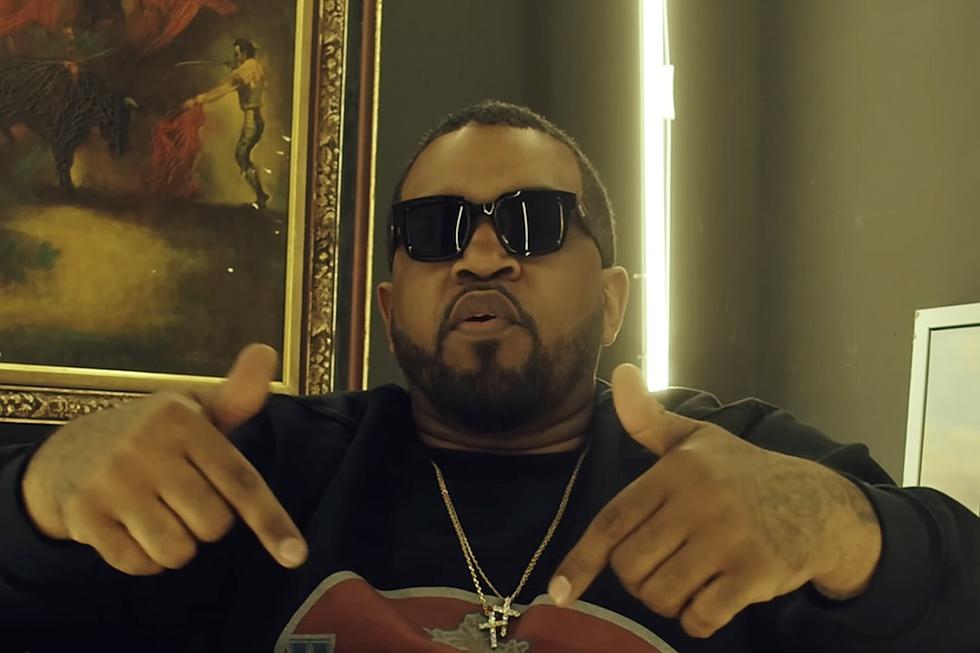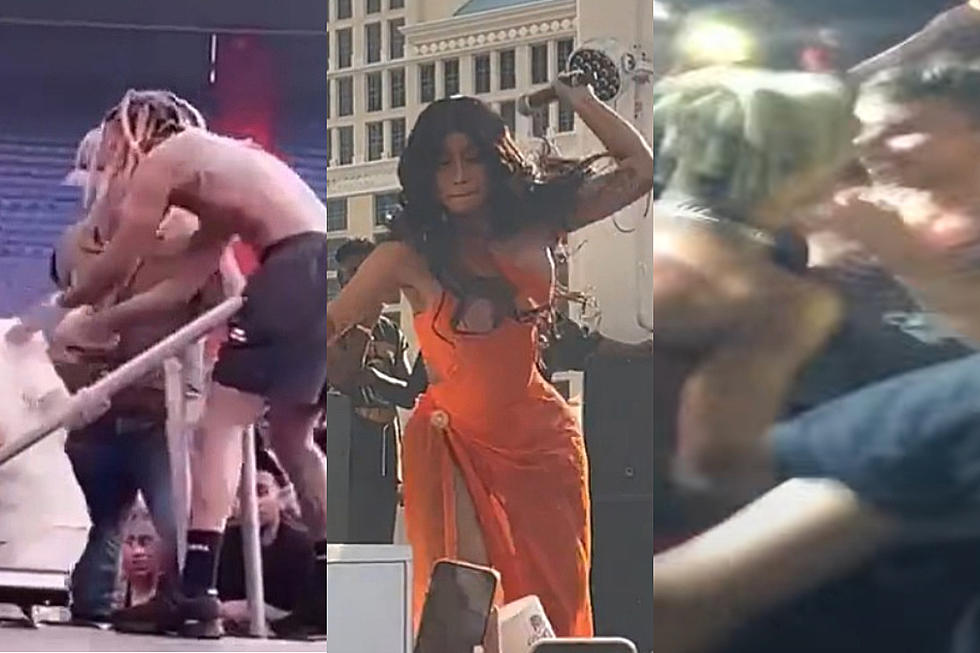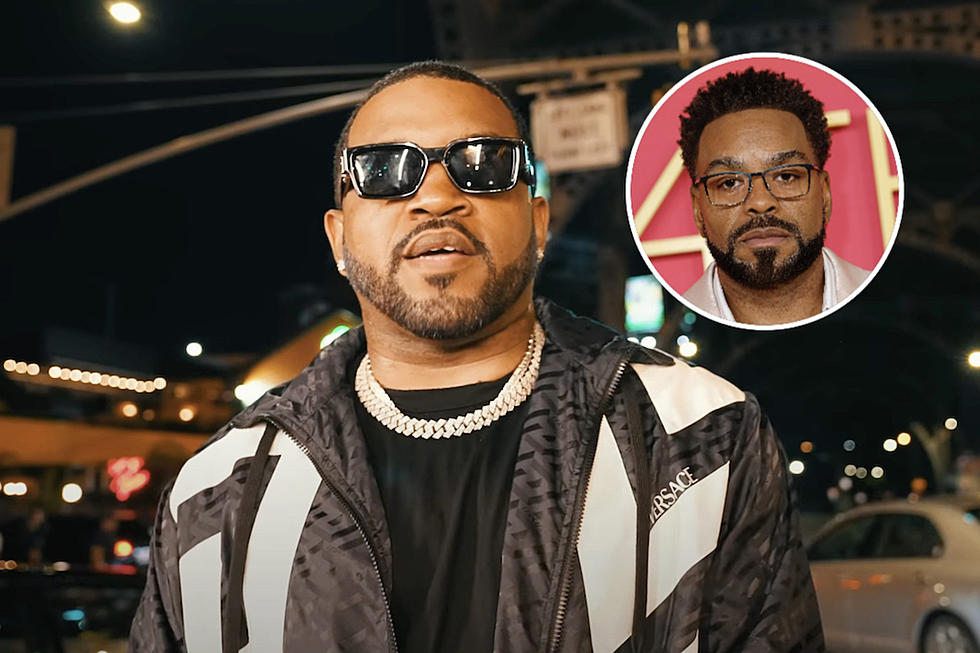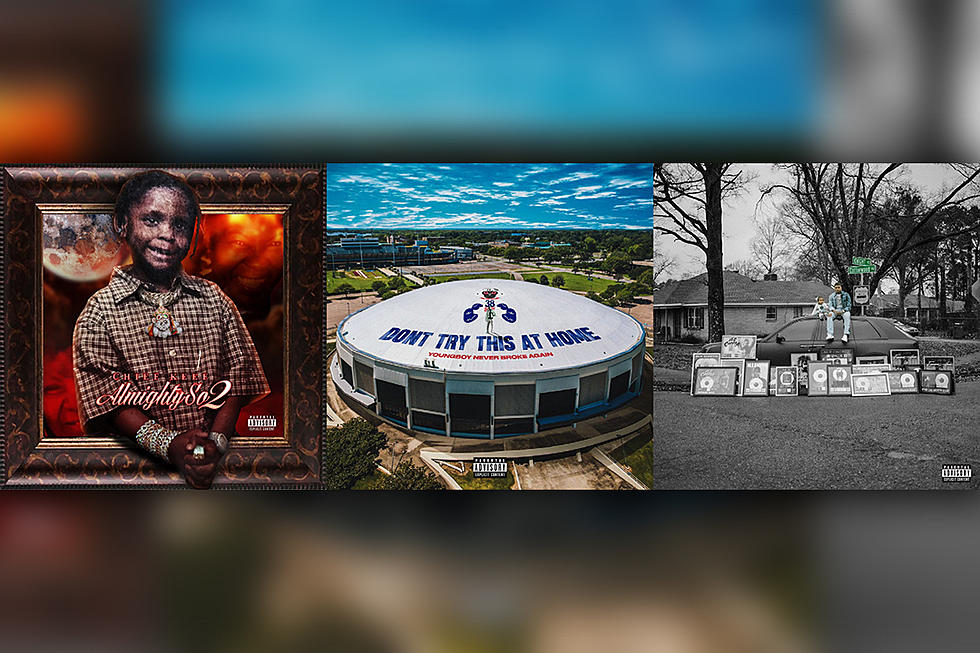
Murs “Make It Work For Ya” & Lloyd Banks “On My Own” (Originally Published July/August 2010)
Hip-hop has its share of self-made success stories. Sometimes, the indie hustle is much more respected than securing a big major label deal. Macklemore & Ryan Lewis are the latest triumph, but there have been other artists in hip-hop that have stuck to this model for years. In the case of Murs and Lloyd Banks, the pair have made a name for themselves through a relentless grind, while sticking to their signature sounds. To honor the indie kings on the Fourth of July, we revisit our July/August 2010 feature showcasing this side of hip-hop. Read our last entry, and check out Strange Music and Duck Down from earlier today.
With little concern over money and record sales, independent expert Murs really just cares about his music.
Written By: Gabriela Alvarez
It’s a long way from Mid-City, L.A., to Manhattan, which is where Cali rhyme representer Murs is shopping for comics on an overcast May afternoon. He’s in town for a stop on his Fornever and a Day tour and is taking a break in his busy schedule for a few hours.
After 17 years in the game, Murs has carved a comfortable spot for himself in the independent-rap world on the basis of hard work and smart decisions. Born Nick Carter (a name he shares with one of the Backstreet Boys), Murs’s early life was in sync with his family’s tradition of earning a dollar. While other kids played with their friends on Saturday, Nick was collecting aluminum cans, helping ladies take groceries to their cars or returning carts at LAX, just to get that cash. “My family has always been entrepreneurial,” says Murs. “So from a young age, I was always taught, if you want a G.I. Joe, find out how to make $2.50. So we would go to the store, and we would push carts to women’s cars for 25 cents.”
While these experiences prepared Murs for his future business endeavors, his shifting personal life probably shaped the insightful views expressed in his music. He often refers to himself as an “at-risk youth” when speaking about his adolescence.
The young Nick Carter never really knew his real dad, who took off when he was four, but Nick did know about moving, which he, his mom and younger brother did a lot of growing up, going from Mid-City (itself a multiethnic mix of middle class meets gang activity), to the “hood hood” of Lynwood, and then on to a predominantly White section of the Valley, before returning to Mid-City. There he began to feel passionate about rapping and formed the group 3 Melancholy Gypsys with friends Scarub and Eligh at Los Angeles’s Hamilton High School in 1992.
After graduating, Murs attended Cabrillo College, in Santa Cruz, California, and continued with his dedication to rap. Soon the budding MC met Mystik Journeymen, trailblazers in the Oakland independent rap circuit. “Mystik Journeymen had developed this underground railroad where they were able to tour Europe [on their own],” says Murs. “[Sunspot Jonz] was like, ‘If you want to rap, you should drop out of community college and come to Europe.’ And I was like, ‘Fuck it, I’m goin’.’”
Getting known overseas during a few weeks of performances in Europe was all good, but there was still noise to be made in America. The Living Legends crew, originally consisting of Mystik Journeymen, 3MG and The Grouch, came together in 1996, and would soon blow upon the independent-hip-hop scene. Murs’s first solo album, F’Real, followed a year later. It was just the beginning of a prolific run that would see Murs come into his own as an individual artist and a frequent collaborator, thriving within a close-knit community of friends who also happened to be business associates. By the early 2000s, Murs expanded his fan base by working with Slug from the highly popular indie group
Atmosphere, under the name Felt, and signing with El-P’s Definitive Jux label for two noteworthy albums, one of which was Murs 3:16: The 9th Edition, his first LP working with 9th Wonder, formerly of Little Brother.
Signing to a major label is most likely seen as one big-ass achievement to most folks. But in the critical us-against-the-world world of underground hip-hop, it’s considered blasphemy. So when Murs unexpectedly signed to Warner Bros., in 2007, there was backlash from some of his most-loyal followers, before and after the release of Murs for President.
“People think that I sold out, but fuck them,” says Murs. “Indie rappers, we complain about what’s being said in the mainstream. So when somebody offered me a chance [to get a bigger audience], I asked [Warner], ‘Can I say what I want to say?’ And they said, ‘Yeah.’ So fuck that. This was my chance to get on the radio and compete… I sacrificed my independent career to make a difference in my neighborhood.”
While his intentions might have been good, it didn’t stop the normal, slow-grinding bureaucracy of major-label politics to sour Murs on his decision to join the corporate universe. He soon felt a lack of support, both financially and musically, and after about a year and a half on the label, Murs decided he wanted off. After six months of back-and-forth, Murs was released from his contract and able to resume his independent path.
Tonight’s show at the Highline Ballroom in NYC is an intimate affair. After a solid hour of performing, Murs spends twice as long mingling with fans. “What I do this for is because I love to see people happy,” says Murs.
With the music business as a whole long in the dumps and record stores disappearing, Murs stresses the importance of direct-to-fan relationships. “Accumulating e-mails is like accumulating gold,” he says. “That’s why you see me all about [getting] e-mails, shaking fans’ hands afterwards, giving them product direct… What the fuck I got to pay Best Buy for? You [the artist] pay for [your album to have] that $6.99 sale price. They don’t take the loss themselves. You pay them to take that loss, to get people into their stores. They don’t give a fuck what they lose on records, because they are selling microwaves.
“Still, I have a responsibility to fans that buy physical records,” he continues. “So I feel like I gotta go do this distribution deal [with Fontana/Universal through SMC Recordings, for his latest album, Fornever], but I hate it. There’s so many politics... I have this indie spirit in me. I wanna say, ‘Fuck it,’ and turn my back on it, but it’s about being smart. There’s good people that shop at Best Buy, so I can’t get into the ‘fuck the industry’ mode.”
It’s 1 a.m. Murs has finished shaking hands and answering questions for the night. “For a second, I had a convertible S500 Benz, brand-new, driving around Hollywood, going to after-parties and shit,” he says before heading back to the hotel. “But it wasn’t me, man. It was something I did because people won’t do business with you unless they think you’re doin’ what they’re doin’. But all that shit is empty. I don’t need gold chains. I own property. My property makes money, so that should be able to take care of my family. I’m not tryin’ to be a billionaire. If there’s 3,000 people that will buy my music, that’s enough for me. Because I’m not gonna spend a billion dollars. The culture of greed has put America where it is today. People think, [I want to be] independent so [I] can get this money. I’m thinkin’ independent because I want to do what I want when I want.”
In other words, Murs is cashing in on the American dream: freedom.
It isn’t for everyone, but with an increasing number of rappers getting lost in the major-label system, for some, independent is the way to go.
Written By: Ben Detrick
It’s no secret anymore that music sales have been on the decline. Even as digital singles surge in popularity, album
sales continue to plummet (in 2009, LP purchases dipped another 12.7 percent). The traditional symbiosis—labels
profit from album sales, while artists get rich off royalties and shows—has been disrupted. MCs, executives and every self-appointed expert on the Web all whimper the same slogan: Nobody sells records anymore.
Enter the independent label. Due to the democratizing effects of technology, the narrowing distance between artists and fans, the benefits of artistic control, and the upending of the industry, the present could be the time for MCs to consider indie careers. As opposed to major labels—a classification that includes imprints or boutique labels funded or owned by Sony Music, Universal Music Group, EMI Group or Warner Music Group—an indie traditionally operates without big corporate backing (although the actual manufacturing and distribution of records is often handled by an outside company).
While artists on independent labels sacrifice powerful marketing and promotions budgets, A&R representatives and top-notch music production, they gain more control of their careers, ownership of their masters and, usually, a substantial cut from sales. In the past, indie artists would press up vinyl singles or sell cassettes from their trunk. Now they plug in the laptop. Anyone with a computer can produce beats, with a MySpace account can upload songs, with a Flip cam can make videos, and with a Twitter account can communicate with the public. The cost-efficiency is unbeatable. “I’m already [at] 400,000 units sold, [with a song] I recorded in my home,” says Lloyd Banks. “It feels good to do it the old-fashioned way. It’s like selling out the trunk—just through the Internet.”
The G-Unit lieutenant released two albums with G-Unit/Interscope—his platinum-plus solo album The Hunger for More, in 2004, and 2006’s Rotten Apple, which sold only 350,000 copies. In 2009, The Punch Line King confirmed that he had parted ways with parent company Interscope Records. He’s since gone indie himself, as a G-Unit
Records artist, and is enjoying one of the biggest hits of his career with “Beamer, Benz or Bentley,” a darkly hypnotic single featuring Dipset flame-spitter Juelz Santana. The 400,000 units the hit sold digitally is 50,000 more than his last album did. “When you on a major, it depends on how many people are on the label,” says Banks. “You could be [either] a name in the computer or a priority, because you’re only as hot as your last record.”
Once independent artists have established a following, the cagey ones can exploit their popularity to create revenue streams. With low overhead costs and minimal infrastructure, rappers can reap profits from album sales, performances, licensing agreements and merchandising themselves. From video games to commercials, there are plenty of ways for a savvy MC to squeeze money out of a song. “We’re starting to see that we can book our own shows, put out our own projects and reach directly to the fans,” says Naledge of Kidz in the Hall, an indie hip-hop group that started on Rawkus Records in 2006 and currently resides on indie powerhouse Duck Down Records. “You can cut out the middleman altogether, and that’s scaring labels, and promoters and a lot of people.”
If going independent is a sensible way for new artists to capture the spotlight, it also seems like a logical shortcut for veterans who have previously had the firepower of a major’s promotion behind them. This option makes most sense for those who have seen their stardom wane but still have a core fanbase and good business sense. Ice Cube is currently more famed for his Hollywood run than for his later-in-life musical career, but he’s had success putting out his last three albums on Lench Mob Records, his indie label.
“Laugh Now, Cry Later embarrassed a lot of majors,” says Cube of his 2006 LP, which was certified gold. “It embarrassed a lot of people who make it their business to sell records—in a bad economy, in a bad time. We sold that record with six people: an aggressive team with a plan. And we didn’t spend a whole lot of money. To me, that’s the way to go.”
In addition to racking up iTunes, ringtone and other online sales, smaller labels are able to get physical product into stores, for people who still purchase records the old-fashioned way. “The major labels that exist have a long history of experience, established relationships, and there’s some muscle there. But beyond that, we have the ability to get product in the same stores,” says DJ Next, the founder and CEO of Amalgam Digital, a Boston-based label that has put out albums from Joe Budden, Saigon and Curren$y.
Still, artists must be realistic about the drop-off. Joe Budden’s 2009 album, Padded Room, on Amalgam, moved 30,000 units, while his self-titled debut, released on Def Jam Recordings in 2003, sold approximately 430,000 copies. Is the sales decline based on less fans or lack of overall sales, or the usually lower sales on an indie label? Hard to say.
Just as selling albums without a major-label machine can be difficult, it can also be a challenge for indie artists to crack into national radio rotation. Despite legal efforts to curtail payola, majors still have the resources to get their artists spins. Clear Channel, which owns and operates 900 radio stations across the USA, is suspiciously opaque about the process by which songs are selected for airplay (through a public relations representative, the company refused to speak with XXL).
Of course, life on an indie label has downsides. For starters, rappers should temper their expectations for stardom, platinum plaques and million-dollar advances. But for those willing to exert the effort, going indie can be a viable way to sustain a career and bank account. “When you’re in this business, you gotta be a scrapper and a hustler,” says Freeway, who released his latest album, The Stimulus Package, last February with producer Jake One on Minnesota indie RhymeSayers Entertainment, after starting his career by putting out two LPs on the major Roc-A-Fella Records. “I’m feeding my family, and I’m comfortable. I’m willing to put that work in.”
What the business is?
More From XXL









